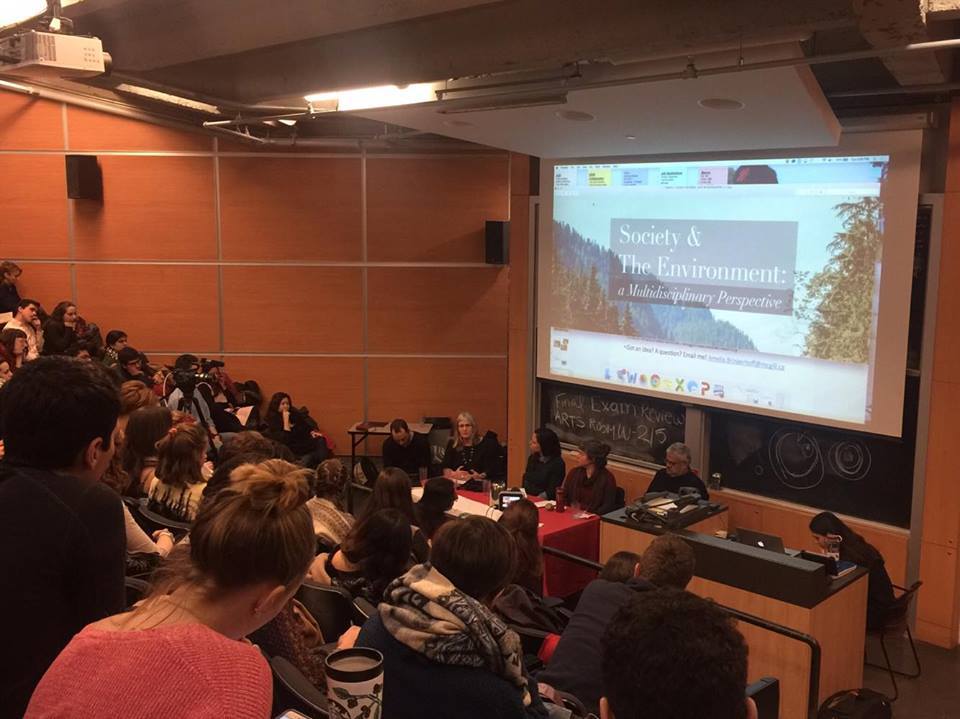On Jan. 17, World Wide Fund for Nature (WWF) McGill and the Arts Undergraduate Society Environmental Council (AUSEC) hosted a panel discussion titled Society & The Environment: A Multidisciplinary Perspective.
Leacock 26 was packed as students gathered to see experts discuss the current ecological crisis—but as the name of the event suggested, the emphasis was more on the socio-economic implications of climate change. Over the course of the evening, speakers discussed the way that economy, politics, and indigenous cultures relate to climate change. The major focus of the night was on inspiring social change, as it is not just scientists, but members of society, that will decide the fate of the planet.
The panelists included Madhav Badami, a professor in the McGill School of Urban Planning and the School of Environment; Jennifer Gobby, a PhD student in Renewable Resources at McGill; Jad Robitaille, board member of Maisons Passive Quebec, which is a non-profit organization that publicizes energy efficiency standards and certifications in buildings in many European cities; Holly Dressel, a journalist, author, and documentary writer; and Nicolas Kosoy, associate professor in the McGill Natural Resource Sciences Department.
For Celeste Welch, U3 Science student and president of WWF McGill, it is important for students to recognize that sustainability is multidisciplinary. Welch hoped that the event would showcase a specific type of environmentalism that examines the interactions between the environment and society.
“Via this [multidisciplinary] perspective, students are able to see that society itself is largely reliant on the environment, and [that] social values often dictate decisions in environmental policy,” Welch said.
The first speaker of the evening was Professor Badami, who discussed population control. He reminded attendees that one of the greatest challenges facing humanity is providing for a population that is likely to hit 11 billion people by the end of this century, which demands more food and energy production.
Badami also spoke about renewable energy. One massive obstacle in switching to renewable sources of power, such as solar or wind, is the transportation industry. He also referenced coal-mining towns in the Appalachian mountains in the United States as a challenge to environmental sustainability. As society moves toward cleaner alternatives of power, the future of these communities, which are economically reliant upon the coal industry, is a political unknown.
“In the recently concluded U.S. elections, what’s happening to coal country in Appalachia became a political hot potato,” said Badami. “You want to transition from coal to cleaner energy sources, but on the other hand, what happens to this industry […] and entire communities that are dependent on coal?”
Politically, the transition from fossil fuels to renewable energy is a lengthy process, but nonetheless a viable solution. Badami explained that pricing is another climate change mitigation strategy; fossil fuels must be taxed, and their extraction shouldn’t be subsidized.
While Badami focused largely on population and environmental policy, Robitaille took on energy conservation from an urban planning approach. According to Robitaille, buildings produce about one third of the greenhouse gas emissions in Canada, and as houses grow in size, so does the total area that must be heated and cooled. In addition, the rating systems of building sustainability are voluntary, and are often used by companies purely as a marketing ploy to advertise their spaces as “green.”
Robitaille explained the two schools of thought when it comes to living more sustainably. The first is called “techno-fix,” which places the onus on urban planners and building companies to design buildings in ways that decrease the amount of energy consumed. The second is “behavioural change,” which places responsibility on individuals to revert to a natural way of living.
During her talk, Robitaille asked students to raise their hands in favour of one school of thought. Nearly the entire room approved of behavioural change. However, when asked, “How many of you actually do this?” only a portion of the crowd raised their hands. For many university students, the thought of changing the way they live while balancing their packed social and academic lives may seem overwhelming.
"There are some lifestyle changes that I've made while I've been at McGill, like recycling more, not using a car, eating less meat, and learning how to ride a bike,” Deanna Schrock, U0 Environment student and event attendee, said. “But the behavioral changes that were talked about in the presentation were on a much larger scale and are harder to achieve. Institutional change like techno-fix, in addition to manageable behavioral changes, is where we'll find success in the long run.”
There are a variety of perspectives that must be considered when tackling environmental degradation. Though the science is clear, finding locally organized solutions and an understanding of other cultures is not always so.
Kosoy explained the need for interdisciplinary approaches to climate change as a matter of consulting local communities affected in any decisions made about addressing it.
"We can only embrace interdisciplinary and multidisciplinary, […] we can only embrace participatory methods [if] communities have a say and they are the ones that can teach us way more than any books,” Kosoy said. “Understanding that that is the premise of any research in environment, any research in socio-ecosystems, brings our whole discussion together. It is inevitable for all of us in this room to be multidisciplinary."
As part of respecting the needs of local communities—in particular, indigenous communities—affected by climate change, Kosoy placed emphasis upon taking ideas for solutions from cultures other than our own.
“It's the 'otherness' that we have to embrace, respect, and understand,” Kosoy said. “Therefore, we don't have any other option but to dream a different world."







